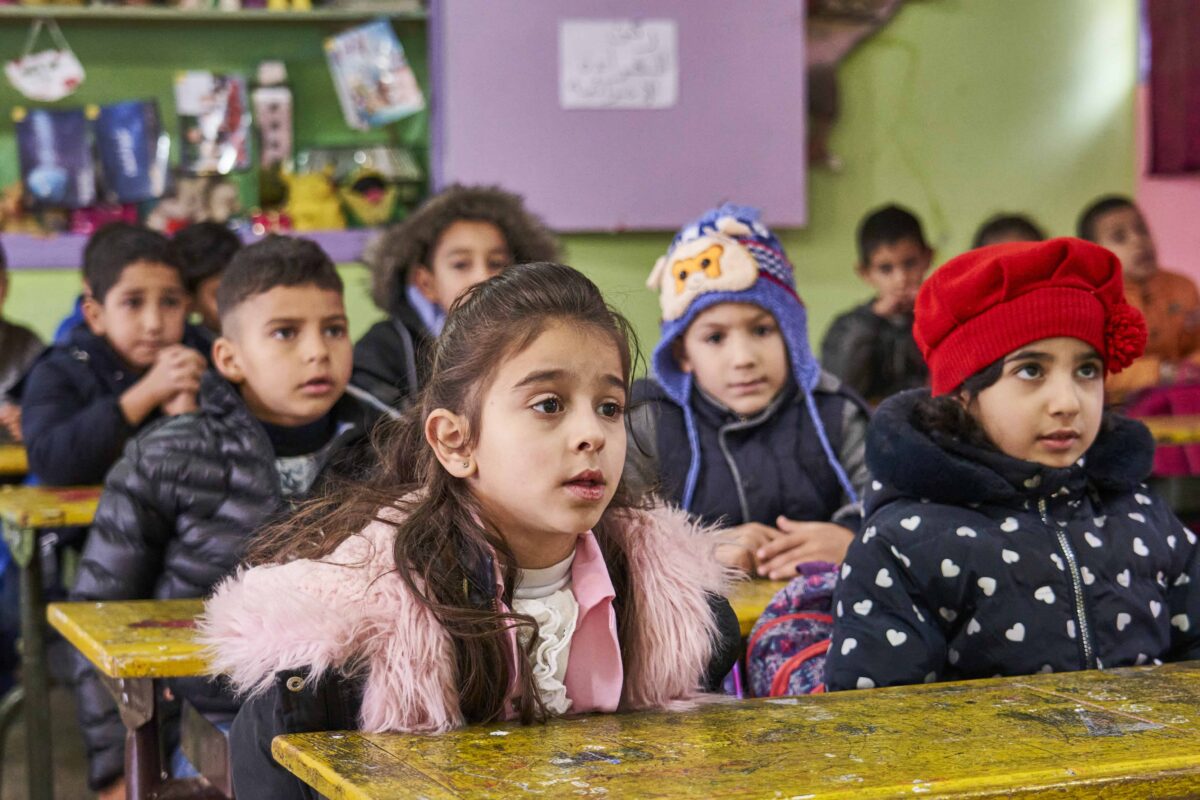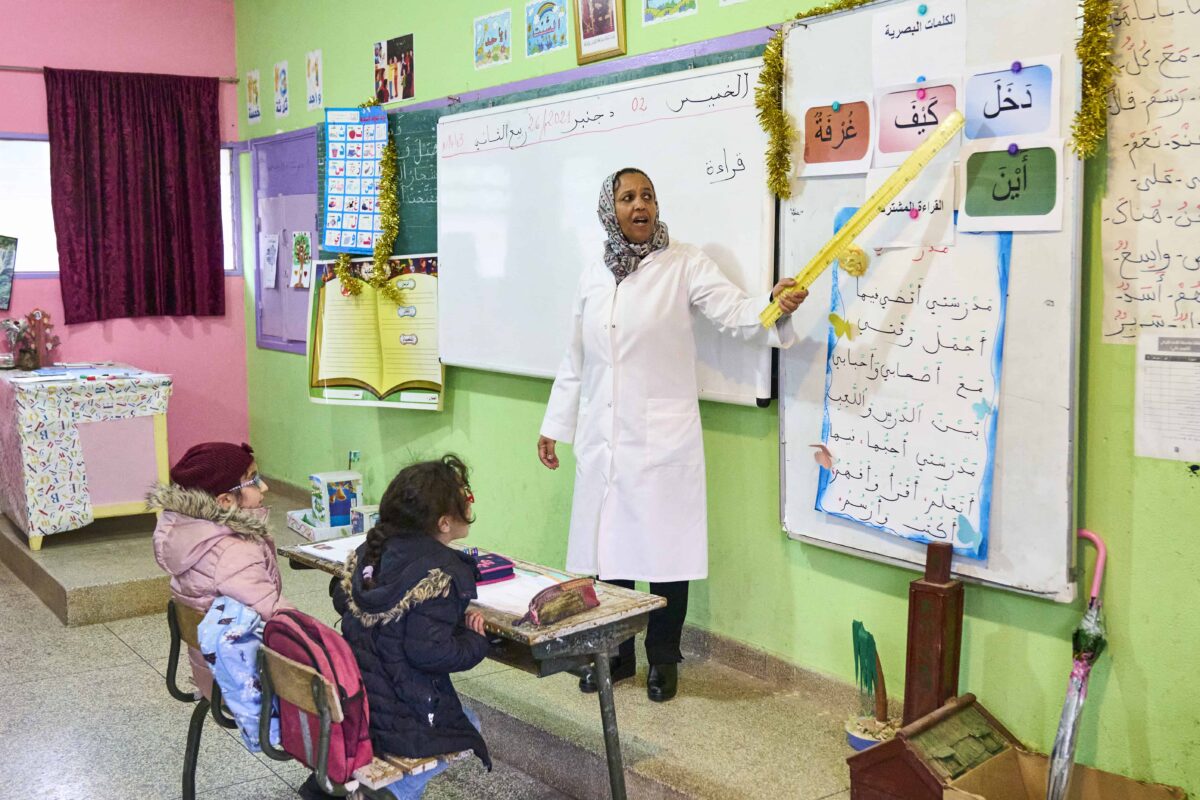Young students in Morocco fell behind in their reading skills to a concerning degree after schools closed in response to COVID-19, and they may require many years of remedial instruction to attain learning standards, according to research by the USAID-funded Reading for Success – National Program for Reading.
Fortunately, the findings from Morocco come with encouraging signs: Although younger primary-school students experienced “disturbing” declines in reading skills, the loss in learning was milder among older primary-school students who had been taught longer under a modernized Arabic language curriculum that emphasizes phonics-based instruction, interactive teaching and student engagement.
In another encouraging note, the research found that educators in Morocco are open to novel approaches to remediation, such as grouping students by skill level rather than by age or creating a hybrid catch-up program that takes place in school and at home.
“COVID has been a disaster for every country around the world. We’re all facing the same problems,” said Karen Tietjen, Creative’s Principal Technical Advisor for Education. “But my knowledge of Morocco tells me that you have tools in place, and that what you need to do is organize targeted brainstorming sessions to craft a national program for school directors, supervisors, and parents so they can systematically help students with learning loss.”
Comprehension skills declined during closures

To measure the impact of the closure of schools in 2020, researchers from Creative Associates International and Management Systems International compared test results from February 2020, just before the closure, and October 2020, after the resumption of in-person instruction, for 641 students in first through fourth grades in 12 schools in three regions of Morocco (Oriental, Rabat-Sale-Kenitra, and Souss-Massa).
This allowed researchers to see how the students’ reading skills changed during the period of lockdown, when a limited amount of distance learning was available and parents were asked to encourage reading. They found:
- Results showed overall gains in reading fluency, measured by the number of correct words per minute the student read aloud from a grade-level text passage. However, the gains were disproportionately among high-performing students.
- Students suffered declines in higher-level skills such as comprehension, grammar, and writing. In an exception, fourth-graders’ ability in listening comprehension improved during the closure.
- Students in predominantly lower-income rural areas were more likely to fall behind in reading skills during the closure of schools than students in largely higher-income urban areas.
Lingering psychological effects
Interviews with students and teachers in October 2020 suggested that feelings of isolation and anxiety from the closure period lingered after the resumption of classes. According to the researchers, this points to the need for additional services addressing students’ mental and emotional well-being. The study revealed:
- More than 50 percent of students said they were sometimes but not always able to solve their problems. About 20 percent of students said they were never able to solve their problems, and about 20 percent said they were always able to solve their problems.
- About 50 percent of students said they sometimes but not always can find someone to talk to when they need help. About 10 percent of students said they never can find someone to talk to when they need help, and about 40 percent said they always do.
“In the classroom, teachers noted a lack of focus, attention, and lesson participation among students, as well as psychological and behavioral issues such as lack of discipline, fear, distrust of others, violent or aggressive behavior, and introversion or extreme timidity,” Tietjen said. “These findings suggest the need for psychosocial support and socio-emotional learning responses…to mitigate students’ feelings of anxiety” as the pandemic continues to disrupt school schedules, she added.
Attempts by the Moroccan government and schools to continue instruction during the closure through distance learning achieved mixed results:
- While 60 percent of first- through fourth-graders said they watched the short daily televised lessons broadcast by the Moroccan government, a correlated improvement in reading fluency was seen only in first- and second-graders.
- Having and reading books at home was linked to an improvement in reading fluency only in first-graders.
- Parental support, although reported by 81 percent of students, was found to have no effect on student learning, suggesting parents and students may benefit from more organized at-home learning activities.
Learning losses had not been overcome by the end of the 2020/2021 school year, which saw reduced class time, high teacher and student absenteeism rates, and occasional closures. In a larger study in June 2021 of the same grade levels and regions as well as Fez-Meknes Region, the researchers found:
- Primary school students’ oral reading fluency and reading comprehension in tests in June 2021 was significantly lower than counterparts tested in June 2018, according to Creative Associates’ Midline School Effectiveness Study of 7,085 first- through fourth-graders in 179 schools. The declines were “especially precipitous” among first- and second-graders, Tietjen said. For example, fluency at the syllable level among first-graders declined nearly 50 percent from 2018 to 2021 and more than 20 percent among second-graders.
- While third-graders scored somewhat lower in fluency and about the same in comprehension in 2021 as in 2018, fourth-graders suffered the least learning loss: Students tested in June 2021 scored almost as high in fluency and slightly higher in reading comprehension than those tested in June 2018.
Older students retained more
The more favorable results for older primary-schoolers reflect well on the effectiveness of Morocco’s new curriculum for reading, writing, and speaking in Arabic, which the Ministry of National Education has rolled out since 2018 with support from the USAID-funded Reading for Success–National Program for Reading (RFS-NPR) implemented by Creative.
“Why are upper grades showing less learning loss? It’s really that they have been exposed to higher dosage amounts of instruction using the new curriculum and pedagogical techniques,” Tietjen said in her presentation. “The longer the exposure to the new Arabic language program over time, the lower the learning loss, with even a modest increase for grade four students.”
Third and fourth-graders were taught under the new curriculum throughout their schooling. By contrast, first- and second-graders had little exposure to the new curriculum before the pandemic.
“Students in the upper grades who have been exposed to the program a little bit longer but also who have been in school longer are performing better than students who either started school during the pandemic or had a substantial part of their schooling history so far impacted by COVID,” said Gaëlle Simon, Practice Area Lead for Education at MSI. “Students in the lower grades, their learning was most affected by COVID. So, there is absolutely a need to focus on students in the lower grades and making sure that we reduce that gap.”
The Moroccan government’s Arabic language curriculum revised with RFS-NPR assistance, a response to Morocco’s longstanding struggle with low literacy, empowers teachers to accelerate children’s acquisition of language skills through phonics-based instruction; highly interactive activities such as storytelling, movement, and role-playing; and hands-on projects in which students apply reading and writing skills while researching topics related to the study units.
In addition to revising the curriculum, Creative worked with the Ministry to create instructional materials, train educators in their use, and strengthen educators’ ability to accommodate different learning levels and assess progress.
Remediation needs and solutions
Although the curriculum allots a review session every six weeks, the researchers concluded that those will not be sufficient to overcome the pandemic learning losses and that extra remediation activities are “acutely” needed, especially for the earliest grades. Educators face difficult choices such as reducing the time for some subjects in order to prioritize foundational subjects, such as reading and math; extending the school day or year; and offering catch-up classes after school or during the summer.
In focus group discussions, teachers, principals, and supervisors (inspectors) agreed on the value of grouping students by skill rather than grade. Those educators also agreed on the importance of providing guidance to parents on how to catch up at home. Creative Associates’ Tietjen recommended a structured approach to at-home remediation under which parents and students receive orientation and materials for distance/at-home learning.

Estimating how long students will need remedial instruction to regain learning levels before the COVID-19 crisis, the researchers pointed to the U.S. example of Hurricane Katrina: After missing four months of school because of that natural disaster, students in the New Orleans area needed remediation for two years before they caught up to learning standards. By comparison, COVID-19 has cost Moroccan students more than twice that – an estimated nine and a half months – taking into account closures and the reduction in instructional time when classes resumed.
“The really good news is that the Ministry already has a lot of tools at its disposal,” Tietjen said. “The inspectors can help guide teachers. Most of them have training and know the new curriculum. Parents are trying to help. What it would take is some organized thought and work in order to structure a more systematic approach.”